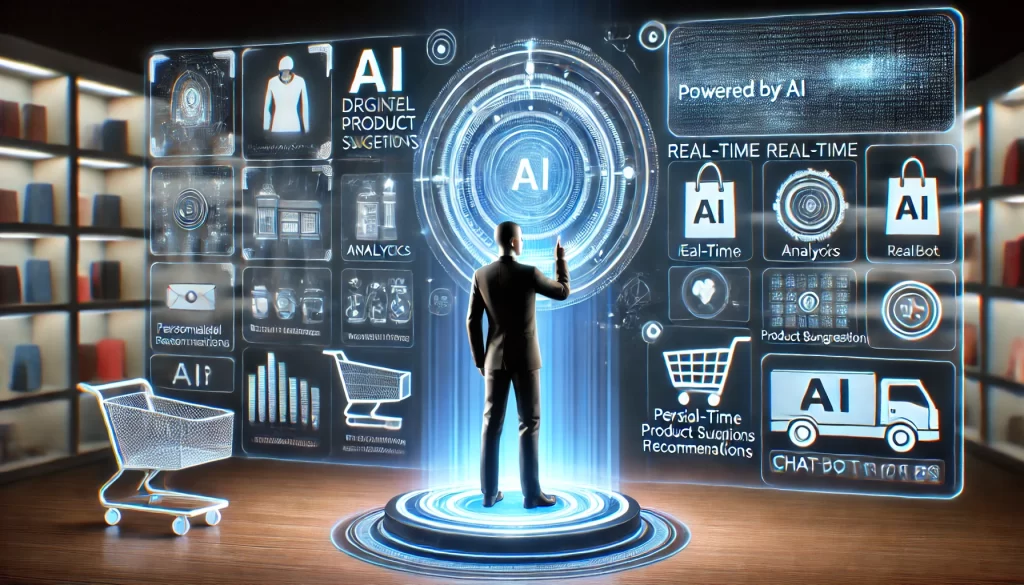AI in E-commerce: Personalizing the Shopping Experience
The e-commerce industry is evolving rapidly, and AI in e-commerce is at the forefront of this transformation. With the increasing demand for personalized shopping experiences, artificial intelligence (AI) is enabling retailers to understand customer preferences, offer tailored recommendations, and enhance customer engagement.
In this article, we’ll explore how AI in e-commerce is reshaping online shopping by delivering highly customized experiences that drive sales and customer satisfaction.
The Role of AI in E-commerce
1. AI-Powered Product Recommendations
One of the most impactful ways AI in e-commerce is enhancing customer experiences is through AI-powered product recommendations. AI algorithms analyze user behavior, past purchases, and browsing history to suggest relevant products.
Examples of AI-Powered Recommendations
- Amazon: Uses AI-driven recommendations to suggest products based on customer behavior.
- Netflix & Spotify: Although not e-commerce platforms, they utilize AI to recommend content based on user preferences.
External Link: Learn more about AI in Retail and its impact on e-commerce.
2. AI Chatbots and Virtual Assistants
AI chatbots have revolutionized customer service in e-commerce. These virtual assistants provide real-time responses, answer queries, and guide users through their shopping journey.
Benefits of AI Chatbots in E-commerce
- 24/7 customer support
- Faster response time
- Personalized interactions
- Automated order tracking and FAQs
Example:
- Sephora’s AI chatbot helps customers find beauty products based on their preferences.
- H&M’s chatbot offers style recommendations based on customer preferences.
3. AI-Driven Visual Search
Visual search technology allows customers to upload an image and find similar products in an online store. AI analyzes the image and matches it with relevant products.
Popular Visual Search Tools
- Google Lens: Helps users find products similar to those in uploaded images.
- Pinterest Lens: Suggests similar items based on image uploads.
4. AI and Predictive Analytics
AI in e-commerce enables predictive analytics, helping businesses forecast demand and optimize inventory management.
How Predictive Analytics Works
- Analyzes historical purchase data
- Predicts future customer demands
- Optimizes pricing strategies
- Prevents overstocking or stock shortages
Example: Walmart uses AI to analyze consumer trends and adjust stock levels accordingly.
5. AI for Personalized Marketing and Email Campaigns
AI helps businesses craft hyper-personalized email campaigns and marketing messages based on user preferences.
Key Benefits
- Higher email open rates
- Increased conversion rates
- Targeted promotions and discounts
Example: Amazon’s personalized emails recommending products based on past purchases.
6. AI-Powered Voice Search Optimization
With the rise of voice assistants like Alexa, Siri, and Google Assistant, optimizing for voice search is crucial.
How AI Enhances Voice Search
- Understands natural language processing (NLP)
- Delivers more relevant search results
- Provides a hands-free shopping experience
7. AI in Fraud Detection and Cybersecurity
AI enhances security by identifying fraudulent activities, reducing chargebacks, and securing customer data.
How AI Detects Fraud
- Monitors unusual purchasing behavior
- Identifies credit card fraud patterns
- Detects fake reviews and bot-generated traffic
Challenges of Implementing AI in E-commerce
1. High Implementation Costs
Setting up AI-powered systems requires a significant investment in technology, infrastructure, and skilled personnel.
2. Data Privacy Concerns
AI relies on customer data, raising concerns about privacy and data security. Businesses must comply with regulations like GDPR to ensure data protection.
3. Technical Limitations
AI systems require regular updates and maintenance to function effectively. Businesses must continuously refine algorithms to ensure accuracy.
Future of AI in E-commerce
The future of AI in e-commerce looks promising, with advancements in machine learning, augmented reality (AR), and AI-powered automation. As AI continues to evolve, we can expect:
- More personalized and immersive shopping experiences
- AI-driven voice and visual commerce
- Improved AI algorithms for better recommendations
Conclusion
AI in e-commerce is transforming how businesses interact with customers by delivering personalized shopping experiences. From AI-powered recommendations and chatbots to predictive analytics and fraud detection, AI is making online shopping more intuitive and engaging.
As technology continues to advance, leveraging AI in e-commerce will be essential for brands looking to enhance customer satisfaction, drive sales, and stay ahead in the competitive market.


